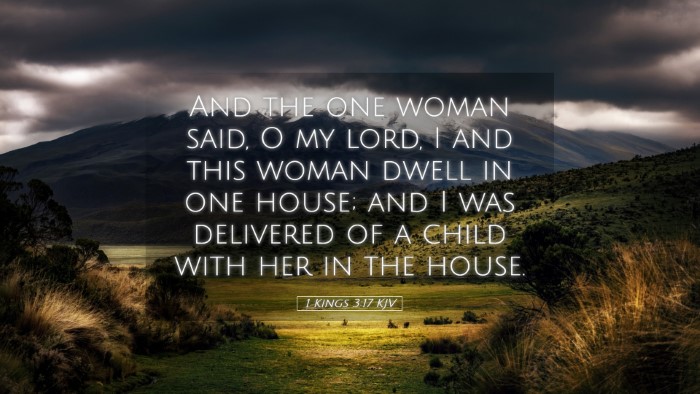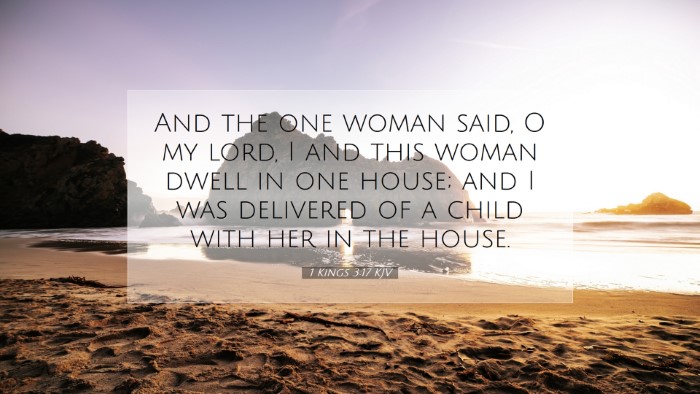Commentary on 1 Kings 3:17
Verse Context: 1 Kings 3:17 states, "And the one woman said, O my lord, I and this woman dwell in one house; and I was delivered of a child with her in the house." This account encompasses a profound narrative concerning wisdom, justice, and discernment, showcasing Solomon’s early reign as king of Israel.
Introduction to the Passage
The story of the two women claiming to be the mother of the same child is a riveting episode that highlights King Solomon’s wisdom. It not only reflects his judicious temperament but also serves as an evident miracle of insight granted to him by God. The circumstances of the claim speak to the complexities of human relationships, motherhood, and justice.
The Characters Involved
- Solomon: Newly appointed king, renowned for his wisdom.
- The Two Women: Claimants to the same child, representing the complexities of human emotions and societal issues surrounding motherhood.
Exegesis and Insights
Matthew Henry's Commentary: Henry emphasizes the immediate context surrounding the passage, highlighting that Solomon’s request of God for wisdom, as noted in the previous verses, culminates in this pivotal moment of decision-making. Henry elaborates on how these women represent not only personal grievances but broader societal struggles. He notes that Solomon's approach reveals both empathy and shrewdness, illustrating how wisdom operates within the constraints of public duty and private emotion.
Albert Barnes' Commentary: Barnes provides vital observation on the cultural and legal context of the time, where such disputes could arise frequently. He notes the potential implications of wrongful judgments and how Solomon's discerning judgment served to uphold justice. Barnes suggests that the passage demonstrates the importance of discernment in leadership roles and implies that recognizing the truth often requires more than just legal acumen; it requires a profound understanding of human nature.
Adam Clarke's Commentary: Clarke delves into the nature of the women's relationship, examining the irony of their predicament. One woman takes the position of a grieving mother, desperate to save her child, while the other embodies the complexities of rivalry and accusation. Clarke further comments on the moral underpinnings of the narrative, stressing that Solomon’s skillful handling of the case not only resolves the dispute but also serves to illustrate God’s providential placement of wisdom in human governance.
Theological Themes
- Wisdom: Solomon's request for wisdom underscored his awareness of the heavy responsibilities of kingship. His decision-making process is a model for leaders today.
- Justice and Equity: The narrative emphasizes the significance of fair judgment, reinforcing the role of God’s ordained leaders to navigate complex moral dilemmas.
- Motherhood and Sacrifice: The intense emotional dynamic between the two women reveals deep aspects of maternal love and the sacrifices associated with it.
Contemporary Application
The story urges contemporary readers to reflect on the nature of wisdom in leadership, the importance of discernment in our judgments, and the value of empathy in resolving conflicts. Pastors and theologians can draw parallels to modern societal conflicts and the necessity for wise decision-making in their ministries and community engagements.
Conclusion
1 Kings 3:17 provides a profound insight into the nature of wisdom, justice, and human relationship dynamics. Through the lens of Solomon’s discernment and the poignant narrative of the two women, we are reminded of our responsibility to seek wisdom, to judge fairly, and to understand the depth of human emotions in all our dealings. This passage not only serves as a historical account but also as a timeless foundation for understanding the intricacies of leadership and justice in a complex world.


